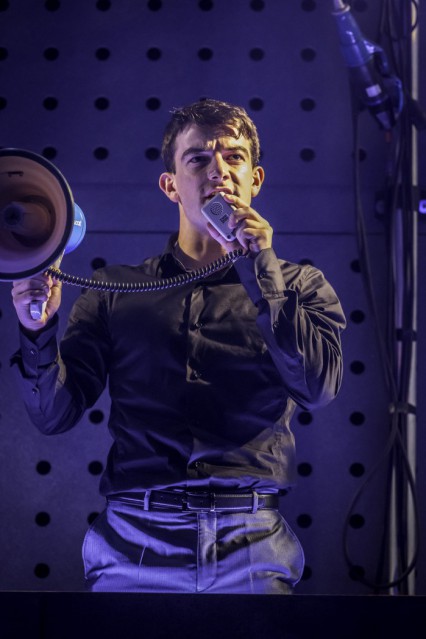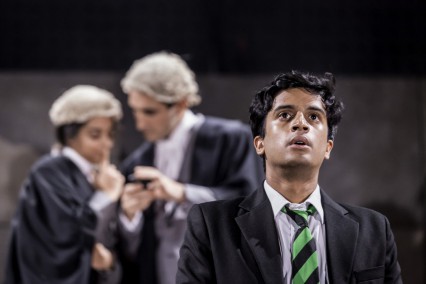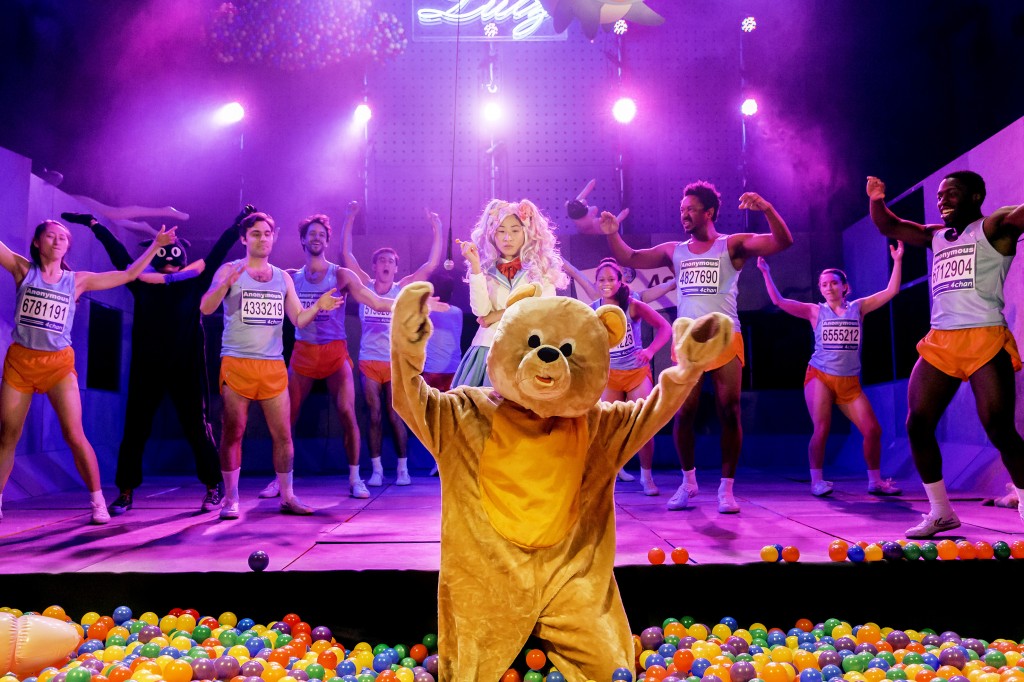Written by Tim Price
Royal Court Theatre, London
The presence of a ball-pit in the apron of the Royal Court stage is an early indication of the subversively playful qualities of Tim Price’s bold, satirical and highly entertaining socio-political drama Teh Internet Is Serious Business. The intentional spelling error in the title alludes to the practice of deliberate misspelling adopted by web ‘hacktivists’ who began to wreak online mayhem via image-sharing website 4chan – and Price’s play both celebrates and embodies the anarchic spirit of their wicked humour and digital mischief.
Teh Internet Is Serious Business tells the true story of a brief but heady period in 2011, when the web became the locus of a series of anti-government and anti-capitalist campaigns, through the careers of two young British ‘hacktivists’. One is Jake Davies (Kevin Guthrie), who escaped the isolation of his home in the Shetland isles to become the global spokesman for the notoriously free-wheeling Anonymous/Lulzsec collective. The group attacked the Church of Scientology, Fox Television and the CIA, amongst others, for the perceived crime of using the internet as a means of control and mass manipulation. The other central character in the play, Mustafa Al-Bassam (Hamza Jetooa), is a socially awkward though incredibly bright 15-year-old London schoolboy, who went on to write a disabling code that facilitated discreet, anonymous social media communication between protesters during the early days of the so-called ‘Arab Spring’.

This fascinating story has been scrupulously researched, with the apparent full participation of Davies who also supplies the programme notes. Yet this research is worn lightly, and a mass of complex, technical information is handled adroitly, with wit and intelligence by Price, who succeeds in beating some considerable dramaturgical risks in an impressive feat of play-writing technique. The finest moments of the play arrive in scenes in which the ‘hive mind’ of the website chatroom is dramatised by layers of dialogue that represent hundreds of overlapping, simultaneous conversations. Price and director Hamish Pirie achieve this through narrative clarity in the writing, and skilful ensemble acting from a young and talented cast. This achievement comes at a cost, however, which is that Jake and Mustafa are all too often obscured by the welter of many voices, and the need to contextualise the virtual happenings of the Lulzsec ‘digital world’ with their ‘real’ life consequences. All of which also contributes to a bladder-testing, though frequently entertaining, running time of two hours and forty-five minutes with interval.

Many scenes have the feel of a verbatim play, with a multitude of characters expressing themselves in the urgent demotic of contemporary Digi-speak. A highly detailed portrait of a dynamic community is drawn here, rather than multi-layered and nuanced characterisations. Whether or not this constitutes a serious flaw in the play will depend somewhat on your personal opinion as to the function of drama. This improbable story of a scattered group of alienated programmers, who managed to shut down the digital communications of global corporations and national governments, surely required a theatrical telling that was as genre-bending and intellectually stimulating as this production.
Teh Internet Is Serious Business can be viewed as part of a loose trilogy by Tim Price – which includes The Radicalisation of Bradley Manning (National Theatre Wales) and Protest Song (Royal National Theatre) – with all three plays focusing on the ethics and challenges of resisting global capitalism and overweening governments. Price is always convincing and illuminating in delineating how the initial idealism of protest movements is fatally compromised once the exigencies of the power they have acquired result in the imposition of hierarchies and centralising authority. His play makes clear that the humourous cyber-pranks of Anonymous/Lulzsec members could often lurch into callous cyber-bullying, and that social media may have liberated many in the Arab world but it is also a tool that has the potential to persecute and do harm.
In spite of these cautionary notes, the over-riding experience of Teh internet Is Serious Business is one of sheer theatrical delight at the limitless possibilities of the theatre stage and its fluid temporalities. Price’s drama might have had more room to develop its characters in the form of a television series, but there is no better medium than the stage for representing the boundless spatiality of the worldwide web. Given the speed at which the virtual world changes, some of Price’s jokes about ‘Rickrolling’ and other memes appear somewhat dated, but the comic potential offered by virtual avatars is exploited to maximum effect by a cast who shed and slip-on their numerous character personas with dizzying speed.

Credit: Johan Persson
The play concludes with Jake and Mustafa outside a court where they will face prosecution from the UK authorities. Yet, as both young men meet each other in person for the first time, they are suddenly amused by this new turn in their relationship and share a laugh together in spite of the danger. Thus a small note of optimism is struck, which is surprisingly moving as it reaffirms the human need to connect. Teh Internet Is Serious Business is, at turns, puerile, rude and occasionally bonkers, but underneath its narrative sweep and satirical edge its heart is in the right place. It is encouraging that a Welsh playwright is writing dramas that will be relevant to the lives of young Welsh people not because they are set in the localities of Wales, but because they acknowledge that even in the remotest parts of our nation one can be connected to the entire world.
Image: Sarah Golding (Grumpy Cat) in Teh Internet is Serious Business at the Royal Court. Credit Johan Persson











